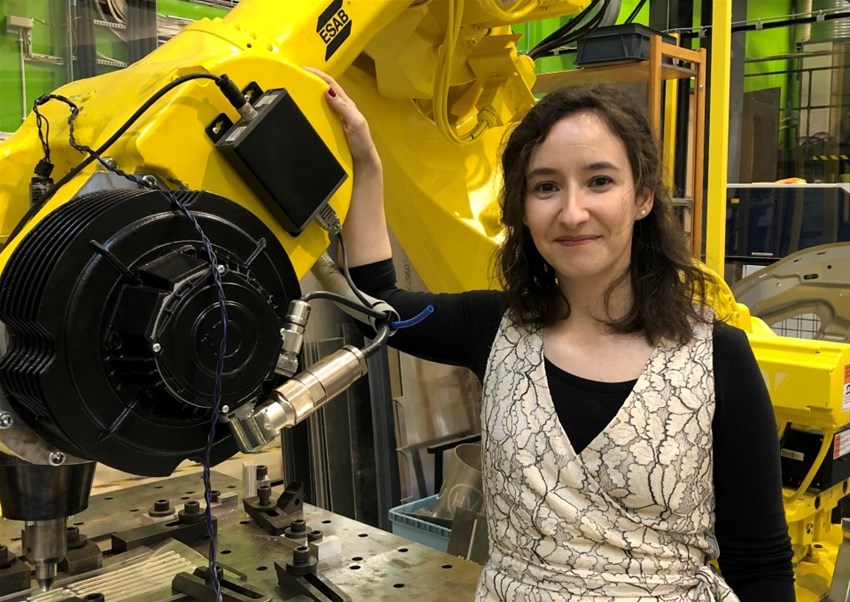Ana's research shows that "impossible" welding is actually possible
18 May 2020
University West’s graduate student Ana Magalhães has demonstrated that what was previously considered impossible actually works; namely, robotic welding components with complex geometries in aluminum using friction stir welding (FSW). – With effective temperature control throughout the welding process, it gets easier to weld using a robot and achieve joints with improved quality. It saves both time and material, explains Ana.

When Ana presented her dissertation online in March, the broadcast was followed with great interest by companies and researchers in different parts of the world. Aluminum friction stir welding has rapidly become increasingly interesting for the aerospace, marine, rail and automotive industries.
The welding method has been most commonly used for straight welds. But there is also an increased need to weld components with higher geometric complexity, such as cylinder blocks for Volvo’s engines. The industrial applicability of this welding method has been questioned for complex geometries due to the inherent compliance in industrial robots caused by the large forces that are required. Using traditional setup, this compliance has led to issues like emergency stops due to the tool dig into the material, but Ana's research project opens doors for new opportunities.
Control through temperature measurement
– I have used the new innovative temperature measurement method, the tool-workpiece thermocouple (TWT), for temperature control of the welding process and shown how it can facilitate the use of robotic equipment for friction stir welding while ensuring weld quality. The measurement method provides good control because it allows us to follow the temperatures created in real time at the weld area. Factors that affect the temperature can then be controlled in an efficient way – for example, the rotational speed and pressure of the tool.
Having the right temperature throughout the process is crucial to the weld quality. Ana's extensive tests show that welding with temperature control facilitates achieving improved joint performance, uniform tensile strength along the joint and fewer welding defects.
Avoiding damages
– The benefits are many. This welding approach mainly saves time and material as it avoids damage to the component and the tool. It is faster to develop the welding process and the method can be applied in several machine types, not just industrial robots.
– My research is focused on aluminum, but friction stir welding is also applicable for welding in steel, magnesium, copper, and other materials.
The research results are particularly interesting for the aerospace and automotive manufacturing industries, but its benefits can be used in many more applications. This is an important reason why companies such as ESAB, Hydro, Sandvik, Saab, Volvo Cars and the research institute TWI participated in the project together with University West.
Multidisciplinary research
Ana has spent a lot of time conducting practical tests and experiments in the lab at the Production Technology Center in Trollhättan. Among other things, she has performed the welds, including the advanced welding joints in the cylinder blocks, implemented different temperature methods and designed the tools used. Her multidisciplinary research work has meant that she has learned everything from material knowledge, measurement, and welding technology to the programming of industrial robots.
– This is really multidisciplinary research with problem-solving in many different technology areas. But I have gotten great help from the supervisors and colleagues in the lab.
Want to continue working in the industry
In addition, over the five and a half years of research, Ana has also gotten married and had a child.
– For me, being a doctoral student and starting a family has worked fine. I have been able to have parental leave just as you are in any other profession. It is something I really appreciate with working in Sweden.
Now other doctoral students will take over where Ana finished. Several new research projects have been linked to her work. Much remains to be explored regarding friction stir welding and the TWT temperature measurement method.
– I would like to continue doing exciting work in the industry and explore the opportunities that friction stir welding provides.
Contact Information:
Email: ana-catarina.ferreira-magalhaes@hv.se
Tel: +46-520-223263 or +46-767119045


